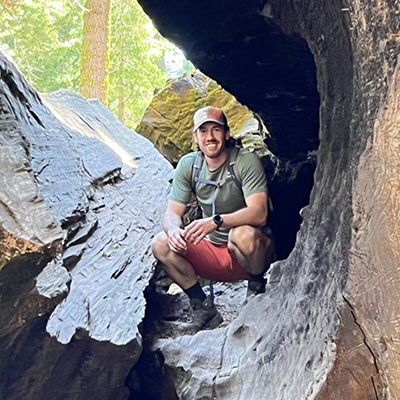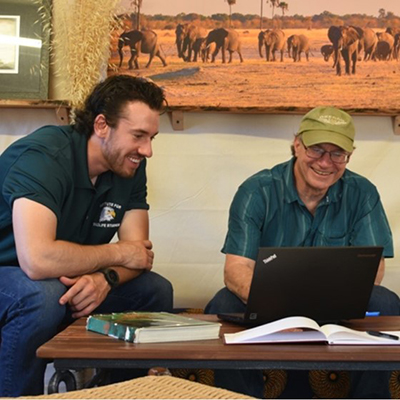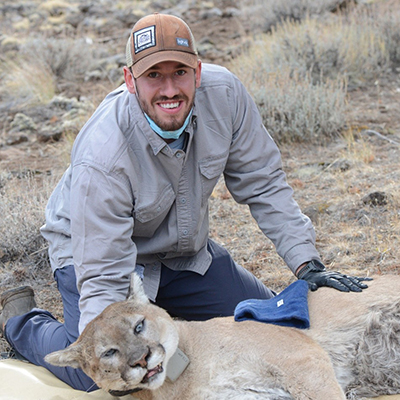
Meet Jake Harvey
Prior to joining the School of Natural Resources at the University of Nebraska-Lincoln, Jake Harvey worked as a mountain lion research technician for the Institute for Wildlife Studies on True Wild and Audubon Canyon Ranch’s Living with Lions project in northern California. After receiving approval to transition his involvement on the project to a graduate student, Harvey developed potential thesis questions and pitched his ideas to a field of researchers at the California Mountain Lion Researchers Workshop where he met his advisor, Dr. John Benson. Prior to committing to the University of Nebraska-Lincoln, Jake applied for the National Science Foundation’s Graduate Research Fellowship Program (NSF GRFP). Partway through his first semester at UNL, Jake was among the 10% of 15,000 graduate applicants awarded the prestigious GRFP. The 3-year fellowship is accompanied by a tuition waiver, monthly stipend, and cost of education funds used to cover miscellaneous project costs. In this interview, Jake speaks about his academic program, passion for mountain lions, and the life of a new graduate student at the University of Nebraska-Lincoln.
Q. Jake, what’s your study about?

Broadly, we hope to better understand mountain lion behavior and movement in a human-dominated landscape. My thesis involves analyzing mountain lion diet, space use, and energetics in California’s San Francisco North Bay. Much remains unknown of mountain lions in this urban system as the complex fragmented landscape has altered mountain lion behavior with insufficient information pertaining to local ecology and habits. I seek to assist in gaining a better understanding of mountain lion ecology to inform management decisions and educate the community to promote coexistence and long-term conservation of mountain lions, as well as their prey and habitats.
Following the Spring 2022 semester on campus at UNL, I traveled back to CA where I am just over halfway through 15 months of fieldwork. In California, we currently have 8 radio collared mountain lions from which we receive a GPS location every 2 hours. Using this location data, I can track individual movements across the landscape and when GPS fixes begin to cluster in a small area, it is likely that the mountain lion is feeding in that location. Most of my days are spent contacting private landowners and hiking into these potential feeding locations to collect data on prey selection, consumption status, and various habitat metrics.
Q. How did you come about the passion for carnivore ecology?
I grew up in rural Pennsylvania, recreating outdoors in the Allegheny National Forest. If I was not playing baseball, basketball, or soccer, you could find me in the woods hiking, hunting, or mountain biking. When it came time to think about college, it was an easy decision for me to attend Paul Smith’s College (PSC) in the heart of the Adirondack Park in upstate New York. My undergraduate experience at PSC deepened my passion for wildlife and the outdoors as the campus was over 14,000 acres of woods and lakes with just under 700 total students. During my undergraduate summers, I received my first true research experiences working with various carnivore and deer species in Wyoming, Washington, and California. These experiences solidified my passion for ecological research and pushed me to further my education.
Q. So, what’s the progress with your coursework?
During the spring semester I took two courses and left for my long stint of fieldwork. With the 2-hour time change and busy days in the field, I decided against taking online courses while I am in California. I hope to be back in Nebraska at the beginning of summer 2023 to get some writing done before getting back into coursework for the Fall 2023 semester.
Q. What has been your favorite class thus far and why?
While I don’t have much to choose from at this point in time, I really enjoyed NRES898 – Research Methods. This course was my first real exposure to coding in Program R. While it is truly learning a new language, I enjoyed the challenge and I know it will be necessary for all my analyses.

Q. What is something surprising you have learned during your program? How do you think you will apply it professionally?
In the world of large carnivore research, my study area is relatively urban with a significant overlap between mountain lions and humans across the landscape. Additionally, the North Bay is predominately private lands, so I spend significant amounts of time contacting and interacting with private landowners. Through these interactions, I have learned so much about public outreach and the wide-ranging opinions on coexistence with mountain lions. Professionally, these experiences will assist with conflict resolution, science communication, and a broader understanding of the very political side of wildlife conservation.
Q. What are your career goals?
Following my MS work at UNL, I want to further my education and obtain my PhD in large carnivore research. Long term, I would like to remain within academia or work for the government conducting research out west. Ideally, I would prefer a position that still has access to some time in the field with some supervisory duties and ample opportunity to design and publish research.
Q. Is there any fun aspect to your research?
Yes! There are so many great experiences, it is definitely one of those “If you love what you do you don’t work a day in your life” kind of career paths. With most of my time in CA being spent in the woods, I am constantly in oak woodland and redwood forests with occasional views of the San Francisco skyline.

Q. Do you have any fears?
I guess I am not much of a snake guy and I have seen more than enough rattlesnakes during my time in California. Ironically, I have seen more taking out the garbage and doing thing around the house than while hiking in the woods.
Q. Are you close to your family members?
I am super close with my immediate family and much of my extended family. My parents have definitely been a huge inspiration and none of my crazy dreams would come true if it was not for their endless support. Since graduating high school, I haven’t lived within 7 hours of home and that has been one of the most difficult parts of my journey thus far. It makes the holidays that much more special; I have my plane ticket secured to fly back to Pennsylvania in December.
Q. Why did you choose UNL and what’s your spot assessment of that decision?
After developing some thesis question ideas and beginning to look at different programs, the University of Nebraska was not originally on my radar. However, I met my advisor, Dr. John Benson, at a mountain lion workshop in Fall 2021 and after some brief conversation, I knew our research interests aligned almost perfectly. John has done a lot of work with mountain lions in greater Los Angeles, so he is well connected in California and very familiar with mountain lion research along the urban edge.
After my admission to UNL and getting to know John and my lab mates better, we all formed a really close bond. Before I knew it, we were getting together to watch the Super Bowl and filling out our March Madness NCAA college basketball brackets. Stay tuned in the 2023 academic year for the Benson Lab flag football team. UNL was definitely the right choice for me and at this point, John is as much a friend as he is my advisor.
Q. What is something you find interesting about UNL?
Everything about UNL has been a drastic change for me in growing up in a very small town to attending a small liberal arts school in the middle of the woods for my undergraduate education. Lincoln is no metropolis, but to date it is the largest city that I have lived in. As a sports fan, I have really enjoyed the sports culture at UNL, and I am excited to go to some football games when I am back for the fall semester.
Q. Was it difficult finding an accommodation in Lincoln?
Since I started on campus mid-year in January 2022, I did not have much of an issue finding accommodations because not too many people are looking at that time. The School of Natural Resources Graduate Students Association Facebook page definitely assisted in pointing me in the right direction. Coming from California, it was also a breath of fresh air to see the significant decrease in the cost of living in Nebraska.
Q. Do you have plans for a PhD program?
As of now, I do not have a firm plan for a PhD program, but I am only 9 months into my MS program. I do plan on working toward my PhD immediately upon completion of my time at UNL.
Q. If you could have a meal with any person, whether living or dead, who would it be?
Teddy Roosevelt. There must be some good stories associated with such a conservation legacy.
Q. Also, what would you eat?
I looked up Teddy's favorite foods and found, very specifically, "pigs in a blanket and fried chicken smothered in white gravy" - I can roll with that.
Q. Any advice for incoming students?
The wildlife field is known to be competitive, and many people have a pessimistic outlook on finding their dream job. I think the best advice I could give is if you work hard and make the most of every opportunity and there will be a spot for you in the end.
— by Jerome Okojokwu-Idu, SNR Grad student, and Emma Hazel, Recruitment and Retention Coordinator – SNR Graduate Programs